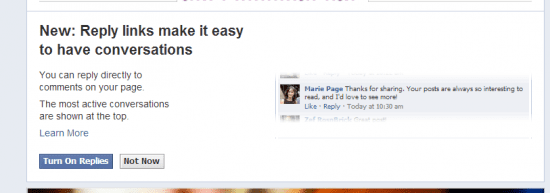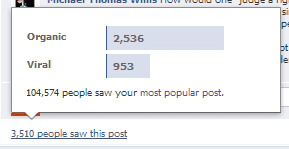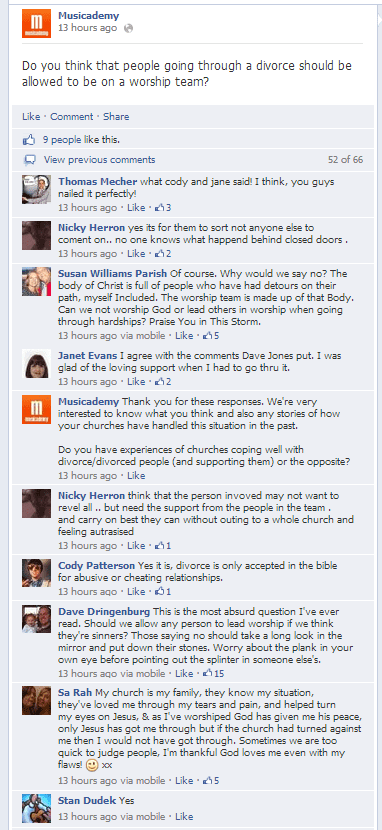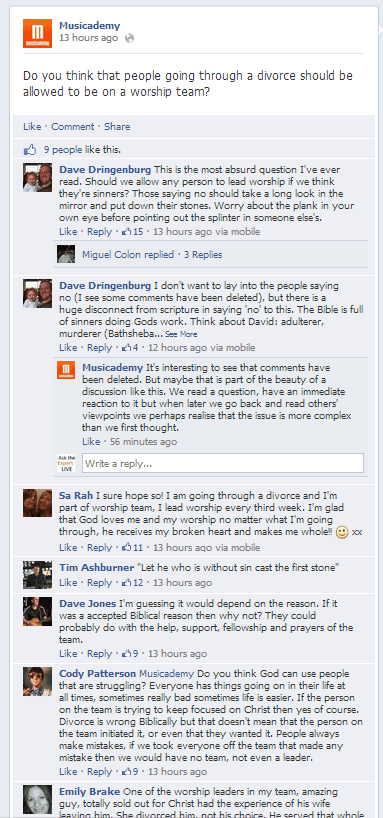Nested Comments are currently a "work-in-progress"
Facebook rolled out yet another change in the last couple of weeks which enables nested replies.
My understanding was that the new feature was only being rolled out to pages with over 10,000 fans, however I was offered it last week so clicked the "like" button. Beware that it doesn't really work on mobile but on the desktop version it is potentially a useful feature for posts with multiple comments and responses.

If you haven't seen the above notification then go to Edit Page and Manage Permissions. From there tick "Replies".

Now I can totally see the sense of nested replies in that people can easily respond directly to comments without the need for an @name before the comment and the resultant scroll up the page to read the original message.
However, Facebook of course have gone far further. In addition to enabling nested replies they've removed the chronological order of replies and instead replaced it with comments in the order of most popular (i.e. those that have received the most likes or additional comments). This is a total nightmare for an admin monitoring a popular post, and is likely pretty frustrating for users too.
This seems a typical case of Facebook following their internal motto of "Move fast and break things". Even basic usability testing, surely would have shown up the problems with this approach. I'm not the only Facebook blogger who has kicked off about this change. Mari Smith and Hugh Briss have both written about the problems and many have rapidly turned off the feature on their own pages.
Below are comparison screen shots of a recent post of mine. On the left replies are switched off so you see chronological comments. On the right you see the impact of replies switched on.
Don't get me wrong, I love the nested replies option, I just want to select to have the comments in chronological order rather than order of popularity.
Lessons in reach
As an aside, this was one of our most successful posts in recent months. Funny stuff is always very viral so hits huge viral reach but this was a dead serious question that within 12 hours of posting had been seen by 50% of our subscribers plus 953 others thanks to viral reach.

Lessons learned from this
This post probably seems somewhat bizarre to you unless you happen to be a part of our target demographic, but for our subscriber base it is a genuinely intriguing question and one a lot of people would have an opinion on. The lessons I have learned from this post are:
- Text updates still have big Edgeweight in comparison to images (a couple of weeks back we posted an image with masses more engagement and viral reach (at 2731 viral views) but our organic reach was only 22%.
- Controversial topics really engage the audience (but be careful not to do yourselves damage - look how neutral we were in this post
- Posting at a time when a maximum of your subscriber base are on Facebook really helps (this was posted in the evening UK time, afternoon US time)
- Continuing the conversation by adding encouraging comments and responding where appropriate helps engagement and encourages commentators
- Rich comments are a mine of content to be repurposed in later blog posts
- Often the comments themselves can be used as a launch pad for future questions
Seeing your community as valuable experts
The question actually arose from a recent change in Facebook strategy for us. Rather than sit in the office thinking up interesting questions for our subscriber base (or creating blog posts that address the questions we think they might have), we began to ask our community what questions they have that they would like to ask each other. Obviously when they post the questions to the wall themselves they tend to get lost as Facebook rightly does not show those kind of wall posts to all the other fans. But if we as the Page owner post them, visibility shoots up.
What we found was that not only did our community have masses of really interesting questions, but the same community was very vocal in their responses. We're gradually moving from being the expert with all the answers, to a portal where people can ask questions and have answers delivered by an entire community of experts, safe in the knowledge that responses are moderated not just by us (already established as trustworthy thought leaders) but also by the community itself.
One thing I have learned from posting numerous questions out to our community is how helpful and varied their responses are. They think of far more to say than I would in a single article and they show such diversity of opinion - there is rarely a single "right" response to many of these issues.
Here's a lovely example. We were asked for advice for a lady who had failed the worship band auditions in her church for five years running. Sensing a Simon Cowell moment coming on, I decided to post the question on Facebook and was overwhelmed by how helpful the responses were. The lady was even challenged to post a recording of her vocals (my heart was in my mouth at that point as there was a lot of room for improvement and I was terrified the community might turn on her - thankfully they responded with grace and helpful advice , due in part to some careful caveating on my part).
I was then able to re-purpose the story to create a blog post using a slightly different angle - How to give kind but honest feedback to musicians who just aren't up to the job.








